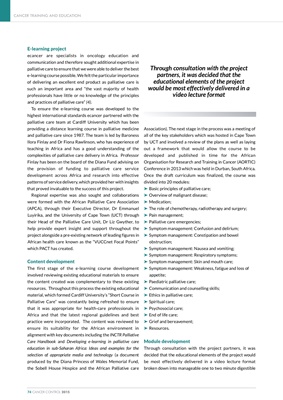
CANCER TRAINING AND EDUCATION
74 CANCER CONTROL 2015
E-learning project
ecancer are specialists in oncology education and
communication and therefore sought additional expertise in
palliative care to ensure that we were able to deliver the best
e-learning course possible. We felt the particular importance
of delivering an excellent end product as palliative care is
such an important area and "the vast majority of health
professionals have little or no knowledge of the principles
and practices of palliative care" (4).
To ensure the e-learning course was developed to the
highest international standards ecancer partnered with the
palliative care team at Cardiff University which has been
providing a distance learning course in palliative medicine
and palliative care since 1987. The team is led by Baroness
Ilora Finlay and Dr Fiona Rawlinson, who has experience of
teaching in Africa and has a good understanding of the
complexities of palliative care delivery in Africa. Professor
Finlay has been on the board of the Diana Fund advising on
the provision of funding to palliative care service
development across Africa and research into effective
patterns of service delivery, which provided her with insights
that proved invaluable to the success of this project.
Regional expertise was also sought and collaborations
were formed with the African Palliative Care Association
(APCA), through their Executive Director, Dr Emmanuel
Luyirika, and the University of Cape Town (UCT) through
their Head of the Palliative Care Unit, Dr Liz Gwyther, to
help provide expert insight and support throughout the
project alongside a pre-existing network of leading figures in
African health care known as the "VUCCnet Focal Points"
which PACT has created.
Content development
The first stage of the e-learning course development
involved reviewing existing educational materials to ensure
the content created was complementary to these existing
resources. Throughout this process the existing educational
material, which formed Cardiff University's "Short Course in
Palliative Care" was constantly being refreshed to ensure
that it was appropriate for health-care professionals in
Africa and that the latest regional guidelines and best
practice were incorporated. The content was reviewed to
ensure its suitability for the African environment in
alignment with key documents including the INCTR Palliative
Care Handbook and Developing e-learning in palliative care
education in sub-Saharan Africa: Ideas and examples for the
selection of appropriate media and technology (a document
produced by the Diana Princess of Wales Memorial Fund,
the Sobell House Hospice and the African Palliative care
Association). The next stage in the process was a meeting of
all of the key stakeholders which was hosted in Cape Town
by UCT and involved a review of the plans as well as laying
out a framework that would allow the course to be
developed and published in time for the African
Organisation for Research and Training in Cancer (AORTIC)
Conference in 2013 which was held in Durban, South Africa.
Once the draft curriculum was finalized, the course was
divided into 20 modules:
‰ Basic principles of palliative care;
‰ Overview of malignant disease;
‰ Medication;
‰ The role of chemotherapy, radiotherapy and surgery;
‰ Pain management;
‰ Palliative care emergencies;
‰ Symptom management: Confusion and delirium;
‰ Symptom management: Constipation and bowel
obstruction;
‰ Symptom management: Nausea and vomiting;
‰ Symptom management: Respiratory symptoms;
‰ Symptom management: Skin and mouth care;
‰ Symptom management: Weakness, fatigue and loss of
appetite;
‰ Paediatric palliative care;
‰ Communication and counselling skills;
‰ Ethics in palliative care;
‰ Spiritual care;
‰ Psychosocial care;
‰ End of life care;
‰ Grief and bereavement;
‰ Resources.
Module development
Through consultation with the project partners, it was
decided that the educational elements of the project would
be most effectively delivered in a video lecture format
broken down into manageable one to two minute digestible
Through consultation with the project
partners, it was decided that the
educational elements of the project
would be most effectively delivered in a
video lecture format